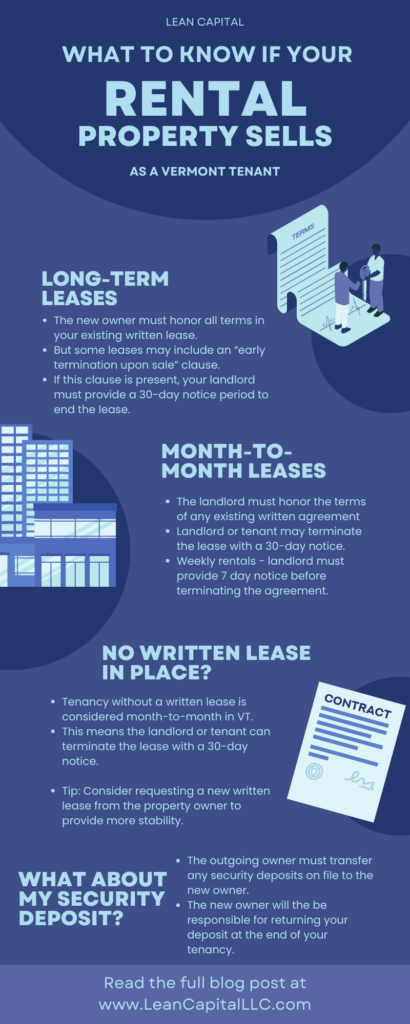
For Vermont tenants, the sale of a multifamily rental property can bring uncertainty around lease agreements, security deposits, and tenant rights under new ownership. Vermont law, however, provides protections that help ensure a smooth transition when a rental property changes hands. This guide covers everything tenants in Vermont need to know about lease continuity, legal rights, and security deposits when their rental property is sold.
Legal Disclaimer:
This post is for general informational purposes only and is not legal advice. Vermont tenants should consult a qualified attorney or Vermont Legal Aid for personalized guidance on tenant rights. Visit www.vtlegalaid.org for more information.
Lease Continuity for Vermont Tenants in Multifamily Buildings
In Vermont, when a multifamily rental property is sold, existing leases generally remain valid, binding the new owner to the terms of the current lease. This means that the new landlord cannot evict tenants without cause or modify the rental terms until the lease term ends, providing peace of mind for Vermont renters. Some leases, however, may contain specific clauses allowing early termination upon sale. If such a clause exists, Vermont law requires that the landlord provide tenants with at least 30 days’ notice before requiring them to vacate the property.
Key Tip for Vermont Tenants: Review your lease to identify any clauses related to early termination or sale. This ensures you are fully informed about potential changes to your lease.
Long-Term Leases
In Vermont, long-term leases extending beyond one year must be documented in writing to be enforceable. When a property is sold, existing written rental agreements automatically transfer to the new owner, who must honor the lease terms. Once the new owner takes over, they are required to follow the normal “No Cause” eviction procedures if they wish to terminate the tenancy without specific cause, ensuring that tenants still have protections under the law.
Tenant Action: To ensure your rights are protected, confirm that your long-term lease is documented in writing. This step helps guarantee that the new property owner must adhere to the terms of your existing agreement.
Month-to-Month Leases
Vermont tenants with month-to-month agreements may experience less protection around their tenancy. This could lead to a situation where the new owner decides not to renew the lease terms or proposes changes. That said, the new owner must still follow state notice requirements for termination (30-day notice), ensuring tenants have sufficient time to adjust to the transition. In weekly rentals, landlords must give at least seven days’ notice before terminating the agreement.
Advice for Tenants in Month-to-Month Leases: Keep records of your lease and all correspondence with the previous and new landlords. Consider seeking guidance from Vermont Legal Aid for support and assistance with your tenant rights.
What Happens When There’s No Written Lease or the Lease Has Expired?
In Vermont, if you’re renting without a current written lease—either because no lease was ever signed, or the previous lease has expired—your tenancy is typically considered a month-to-month agreement by default. This arrangement means that either the landlord or tenant can generally terminate the tenancy with a 30-day notice. When a multifamily property is sold, a month-to-month tenancy offers fewer protections than a fixed-term lease, as the new owner may decide to adjust the rental terms, increase the rent, or ask tenants to vacate. However, they must still adhere to Vermont’s legal notice requirements, including providing at least 30 days’ notice to terminate the month-to-month tenancy.
Tenant Tip: If your lease has expired or you’re in a verbal month-to-month arrangement, consider requesting a new written lease from the property’s new owner to provide more stability and clarity around your tenancy terms.
Security Deposits and Vermont’s Transfer Requirements
When a multifamily rental property in Vermont is sold, the outgoing landlord must transfer security deposits to the new owner. This new owner must then confirm the transfer in writing with tenants and provide their contact information. According to Vermont law (Title 9, Chapter 137, Section 4461(f)), the new landlord is now responsible for returning the security deposit at the end of the tenancy.
Security Deposit Tip for Tenants: Upon sale of the property, ask for written confirmation of your deposit’s transfer. Knowing who holds your deposit ensures you can claim it without complications at the end of your tenancy.
Termination Notice Requirements for Vermont Tenants
For month-to-month or verbal rental agreements in Vermont, the current landlord can terminate the tenancy with a 30-day notice once a property sale agreement is signed. This notice period only applies to the outgoing landlord, not the new owner. However, if you have a written lease, the new owner must honor it for its full duration, providing additional security for tenants in multifamily rental buildings in Vermont.
In weekly rentals, landlords must give at least seven days’ notice before terminating the agreement.
Tenant Takeaway: Written leases offer stronger protections in Vermont, so consider requesting a written lease for any future rentals if you are currently on a verbal or month-to-month agreement.
Understanding the Importance of Tenant Rights in Vermont During a Property Sale
Navigating a Vermont multifamily property sale as a tenant can feel overwhelming, but familiarizing yourself with your rights and lease protections can ease the process. Understanding Vermont’s specific rules for lease continuation, security deposits, and termination notices empowers tenants to safeguard their housing stability and maintain peace of mind. If you encounter challenges, Vermont Legal Aid can provide personalized advice to help you navigate potential tenant-landlord disputes.
How Lean Capital Can Support Vermont Tenants
At Lean Capital, we’re here to provide Vermont tenants with resources and support for understanding their rights and securing quality, stable rental housing. Whether you’re dealing with a property sale or looking for new rentals in Vermont, reach out to us for tenant tips and guidance on navigating Vermont’s rental market.
If you’re interested in finding a new place to call home, check our website at www.leancapitalllc.com for current rental listings. We’re dedicated to helping Vermont tenants find security, stability, and quality housing options across the state.
Looking for More Tenant Resources?
We hope this guide has clarified your rights and options. If you found this information helpful, share it with other Vermont tenants, and follow us for more tenant resources and insights into Vermont multifamily rentals. At Lean Capital, we’re here to help Vermont renters stay informed, protected, and well-supported.
